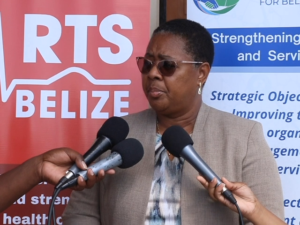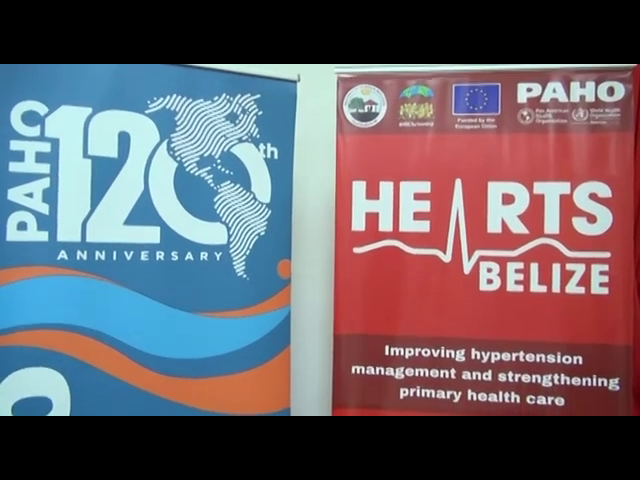Belize joins HEARTS Initiative to Combat Cardiovascular Diseases
The Ministry of Health, in collaboration with PAHO, is implementing new tactics in Belize’s healthcare sector to combat cardiovascular diseases. The HEARTS initiative was introduced to Belize in November 2023, after it proved successful in other parts of the region. Today, key stakeholders in the healthcare sector across the region, and Belize, attended a workshop to learn how to implement the strategies in the HEARTS initiative into healthcare services. Here’s News Five’s Britney Gordon with more information.
Britney Gordon, reporting
Each year, cardiovascular diseases continue to be the leading cause of death globally. Roughly thirty-two percent of all deaths worldwide are caused by related illnesses with low-income countries such as Belize being highly susceptible to these diseases. Diet and lifestyle choices play a major part in the prevalence of these conditions and Belize has struggled to overcome these challenges year after year. To combat these statistics, The HEARTS initiative was introduced to Belize through PAHO, in collaboration with the Ministry of Health. The initiative was implemented locally, in the western region first and now in the central region. Today, members of the healthcare sector gathered to participate in a workshop that will guide them on how to use HEARTS strategies effectively. Doctor Fidel Cuellar, Deputy Director of Public Health and Wellness, explained what the HEART initiative encompasses.

Doctor Fidel Cuellar
Doctor Fidel Cuellar, Deputy Director, Public Health and Wellness
“What HEARTS is, it is a package, various packages that are geared towards addressing risk factors for the biggest reason of death, really, in the Caribbean and Belize, which is cardiovascular deaths. What we’re saying is that we understand that people are dying of hypertension related illnesses, like stroke, heart attack, chronic kidney diseases. HEARTS is going to help us to address this problem, to be able to control hypertension and diabetes the way it should be. Unfortunately, the majority of people who have hypertension, they do not have it properly controlled. And then that leads ultimately to your strokes and your heart attacks. And that is why HEARTS is very important for us in Belize.”

Cuellar acknowledged that cardiovascular diseases have continued to be the leading causes of death in the region, despite previous attempts to combat its prevalence. He explained that the HEARTS initiative is taking a dynamic approach across various aspects of the healthcare sector to combat the condition from several angles.
 Doctor Fidel Cuellar
Doctor Fidel Cuellar
“So what hearts is doing is putting very clear, easy protocols in place so that the physicians and nurses and everybody can get on board. For example, right now in Belize. If you’re just diagnosed with hypertension, depending on which doctor you go to, you will have different medications. The hearts data shows that doesn’t work. You need to be on a specific set of medications for a specific set of time. And it needs to be adjusted in a specific way. So that, in itself, is a big difference. The other difference is the way we approach hypertension. Traditionally, we use manual cuffs, or we don’t use validated devices. And everybody does it their own way. Having people do it one specific way helps us to determine who is hypertensive and who isn’t. And if you’re hypertensive, what is your true number? So these are major changes in the way we approach hypertension and the way we treat it.”
The HEARTS Initiative was launched in 2016, by the World Health Organization and the United States Centers for Disease Control and Prevention with other partners to support governments in strengthening the prevention and control of cardiovascular diseases. Doctor Karen Lewis Bell, PAHO WHO Representative in Belize, explained how the initiative found its way to the country.

Doctor Karen Lewis Bell
Doctor Karen Lewis Bell, PAHO WHO Representative, Belize
“And so the hearts in the initiative, the hearts in the America’s initiative which was launched in 2016 now has some thirty-three countries in the region of the Americas implementing this. Belize implemented it in October 2023. They became the twenty-fifth country in the region to implement this. And I really want to give kudos to the Ministry of Health in recognizing the importance of ensuring proper and comprehensive management. of hypertension and diabetes as part of this initiative. And so PAHO is providing the technical cooperation in terms of training, capacity building, helping to provide the clinical guidelines as well as helping to provide some of the equipment in terms of, the clinically validated blood pressure machines that the health facilities will use to measure diabetes high blood pressure, et cetera. And we are really getting some funding support from the European Union for this workshop that we’re having today and to help to roll up the hearts initiative.”
Cuellar reiterated that the approach of HEARTS is complex, starting at the primary level before working its way through the sector. She said that it has displayed successful results in other regions that can be replicated in Belize with the right approach.
 Doctor Karen Lewis Bell
Doctor Karen Lewis Bell
“And so it’s a comprehensive package of care, and we do it in an integrated way, focusing on the first level of care, what we call the primary health care. As you may know, in many countries, in fact, in all countries, the first level of care is where the individual or the patients will first interface with the health system. And so we have to work at that level, at the village level, and to make sure that everybody understands and is doing the right thing. Doing you know, the initiative in a structured way. And so with this we are building capacity So everyone is on the same page with the knowledge of what to do and how to do but in addition to that the countries that are further advancing the implementation in our region have actually shown significant improvement In the control of these conditions so hospital admissions will be decreased The complications that you may have, like amputation, strokes, heart attacks, will be decreased. And ultimately, we will decrease the deaths from these conditions.”
Britney Gordon for News Five.







Facebook Comments